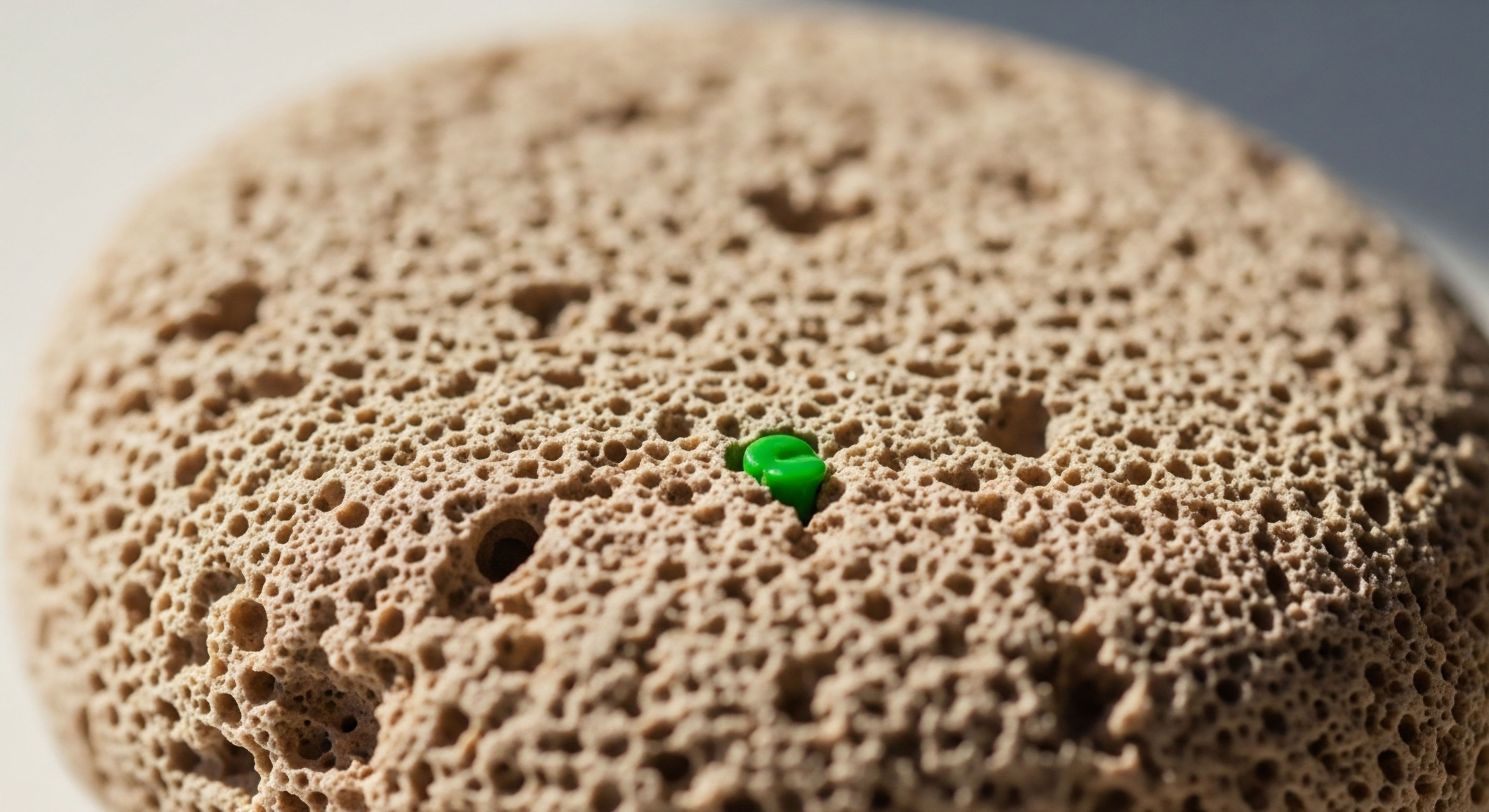

Cholesterol ∞ The Core of Your Biological Authority
The conversation surrounding cholesterol frequently veers into reductionist territory, painting it as a singular antagonist. This perspective fundamentally misinterprets its profound role in orchestrating peak human function. Cholesterol stands as a foundational molecule, the very bedrock upon which steroidogenesis commences. It acts as the master precursor for an entire cascade of vital hormones, dictating the operational parameters of your physiology.
Consider cholesterol as the essential raw material, the premium grade fuel required for the body’s most powerful chemical factories. Without its presence, the intricate machinery responsible for producing testosterone, estrogen, cortisol, and DHEA simply falters. These hormones are far more than mere regulators; they are the command signals for strength, cognitive sharpness, emotional resilience, and metabolic efficiency. Their optimal synthesis, directly dependent on cholesterol availability and processing, underpins every aspect of what it means to operate at your zenith.
The mechanistic clarity here is absolute. Cholesterol, specifically low-density lipoprotein (LDL) cholesterol, delivers the necessary building blocks to cells. Specialized receptors internalize these particles, making their contents available for conversion within the mitochondria and endoplasmic reticulum. This process is not a passive delivery; it is an active, highly regulated system, finely tuned to meet the body’s dynamic demands. Disruptions at this fundamental level reverberate through every system, impacting everything from muscle protein synthesis to neurocognitive speed.
Optimal steroid hormone synthesis, crucial for peak performance and vitality, directly relies on cholesterol as its primary precursor, influencing muscle mass, cognitive function, and metabolic health.
Your primal power, the inherent capacity for strength, drive, and adaptation, finds its chemical genesis in this molecule. It shapes your ability to recover from stress, to build and maintain lean tissue, and to sustain mental acuity under pressure. A systems-thinking approach reveals that a robust cholesterol metabolism directly correlates with a resilient and high-performing organism. This molecule enables the body to construct and maintain the very architecture of its potential.
The notion that cholesterol is solely a marker of disease misses its profound biological imperative. It is an intrinsic component of every cell membrane, dictating fluidity and signaling. It is the molecular architect of Vitamin D, a critical hormone in its own right, impacting immune function, bone density, and mood regulation.
Understanding cholesterol transcends simplistic fear; it demands recognition as a central player in the pursuit of sustained human excellence. This understanding becomes the initial step in reclaiming a more powerful, biologically coherent existence.

Steroid Hormones ∞ Cholesterol’s Directive
The HPG (Hypothalamic-Pituitary-Gonadal) axis, a complex feedback loop, relies on cholesterol as its fundamental input. The adrenal glands also draw upon this resource for cortisol and DHEA production, hormones governing stress response and foundational anabolic processes. These are the command-and-control systems of your biology, directly influenced by the availability and intelligent utilization of cholesterol.
Consider the profound implications for performance metrics. Adequate cholesterol levels support robust testosterone production, a hormone inextricably linked to muscle strength, bone density, and competitive drive. Estrogen, often misunderstood in male physiology, plays a crucial role in bone health, cardiovascular function, and neuroprotection. DHEA acts as a precursor to both androgens and estrogens, supporting overall endocrine balance and anti-aging pathways. The body’s ability to maintain these critical hormonal profiles stems directly from its cholesterol supply.
The impact extends beyond the physical. Cognitive function, mood stability, and motivational impetus all possess a strong hormonal component. Research continually demonstrates the connection between balanced steroid hormone levels and superior cognitive performance, reduced brain fog, and enhanced emotional regulation. Cholesterol, through its hormonal derivatives, acts as a profound influence on your mental landscape, enabling sharper focus and sustained mental energy.


Metabolic Mastery ∞ Shaping Your Cholesterol Profile
Optimizing cholesterol metabolism transcends conventional dietary restrictions; it involves a strategic recalibration of your entire physiological system. The body possesses an innate intelligence for synthesizing and utilizing cholesterol, a process that responds acutely to specific inputs and environmental signals. Mastering this metabolic alchemy requires precision, moving beyond generalized advice to implement targeted strategies that enhance your internal machinery.
Dietary cholesterol’s impact on circulating levels is less direct than once believed. The liver produces the majority of cholesterol your body requires, adapting its output based on intake. Focus shifts to the quality of fats and micronutrients that support healthy synthesis and efficient transport.
Saturated and monounsaturated fats provide structural components for cell membranes and serve as energy sources, indirectly supporting cholesterol synthesis pathways. Adequate intake of specific micronutrients, such as B vitamins, magnesium, and zinc, functions as cofactors in enzymatic reactions crucial for steroidogenesis.
Exercise acts as a potent modulator of cholesterol dynamics. Regular physical activity, particularly a blend of resistance training and high-intensity interval training, enhances the activity of lipoprotein lipase, improving triglyceride clearance and increasing high-density lipoprotein (HDL) levels. HDL plays a vital role in reverse cholesterol transport, shuttling excess cholesterol from peripheral tissues back to the liver for excretion or recycling. This active engagement of the body’s metabolic pathways ensures a more fluid and efficient cholesterol economy.

Strategic Lifestyle Levers
Sleep, often underestimated, exerts a profound influence on hormonal regulation and metabolic health. Chronic sleep deprivation disrupts the delicate balance of the HPG axis, potentially impairing cholesterol’s conversion into steroid hormones. Prioritizing consistent, high-quality sleep represents a non-negotiable component of metabolic mastery, allowing the body to perform essential repair and regulatory functions.
Stress management directly impacts cortisol production, a hormone synthesized from cholesterol. While cortisol is essential for life, chronic elevation can shunt cholesterol away from other vital hormone production pathways, creating imbalances. Implementing deliberate stress reduction techniques ∞ meditation, breathwork, time in nature ∞ protects your endocrine resources, ensuring cholesterol remains available for its full spectrum of physiological duties.
Targeted nutritional strategies further refine your cholesterol profile. Incorporating soluble fiber, found in oats, psyllium, and legumes, binds to bile acids in the digestive tract, promoting their excretion and necessitating the use of cholesterol for new bile acid synthesis. Plant sterols and stanols, structurally similar to cholesterol, compete for absorption, contributing to a balanced lipid profile. Omega-3 fatty acids, specifically EPA and DHA, possess anti-inflammatory properties and support healthy endothelial function, which is integral to cardiovascular wellness.
Targeted exercise, consistent sleep, and strategic stress reduction techniques profoundly influence cholesterol metabolism, optimizing its conversion into vital hormones and enhancing overall physiological resilience.

Biochemical Pathways and Support
The conversion of cholesterol to pregnenolone, the rate-limiting step in steroid hormone synthesis, occurs within the mitochondria. This process requires the enzyme cholesterol side-chain cleavage enzyme (P450scc). Supporting mitochondrial health through adequate nutrient intake (CoQ10, L-carnitine, B vitamins) and regular physical activity directly enhances this foundational conversion.
Understanding these precise mechanisms allows for a more intelligent, proactive approach to health. We are not simply managing numbers; we are optimizing a complex, interconnected system. This approach transforms a passive acceptance of health markers into an active, informed partnership with your own biology.
- Prioritize high-quality dietary fats ∞ Monounsaturated and saturated fats provide crucial building blocks.
- Integrate resistance and high-intensity training ∞ Enhances lipid metabolism and HDL function.
- Optimize sleep hygiene ∞ Essential for hormonal balance and recovery.
- Implement stress reduction practices ∞ Protects endocrine reserves and prevents cortisol dominance.
- Increase soluble fiber intake ∞ Supports bile acid excretion and cholesterol utilization.
- Ensure micronutrient sufficiency ∞ CoQ10, B vitamins, magnesium, zinc are critical cofactors.


Decoding Your Internal Metrics ∞ The Time for Action
The question of “when” to intervene in cholesterol metabolism extends beyond a single high number on a lab report. It involves a sophisticated interpretation of your biological readiness signals, a comprehensive analysis of markers that indicate a system poised for optimization. This approach moves past reactive disease management, embracing a proactive stance towards peak vitality. The moment for metabolic mastery arises when your internal data stream suggests a potential bottleneck in your primal power generation.
Traditional lipid panels provide a starting point, but a deeper dive into advanced lipoprotein analysis offers far greater resolution. Measuring LDL particle number (LDL-P), lipoprotein(a) , and HDL particle number (HDL-P) provides a more accurate assessment of cardiovascular risk and metabolic efficiency. Beyond these, assessing inflammatory markers like high-sensitivity C-reactive protein (hs-CRP) and homocysteine offers insight into systemic health, influencing how cholesterol is utilized and transported.
Hormone panels are indispensable. Comprehensive evaluations of total and free testosterone, DHEA-S, estradiol, and cortisol reveal the downstream impact of cholesterol availability. Discrepancies in these levels, particularly in the context of declining energy, reduced muscle mass, or persistent cognitive fog, signal a potential need for a re-evaluation of your cholesterol dynamics. These are the internal flags indicating your biological system may be operating below its inherent capacity.

Recognizing the Call for Optimization
Your body communicates its needs through tangible experiences. Persistent fatigue, despite adequate sleep, represents a critical signal. A noticeable decline in strength or recovery time following exercise suggests a compromise in anabolic processes. A sustained reduction in mental clarity, focus, or motivation indicates a neurocognitive component that often ties back to hormonal equilibrium. These subjective experiences, when viewed through a data-informed lens, become compelling evidence for targeted intervention.
The ideal timing for action is often proactive, before overt symptoms manifest. Regular monitoring of advanced biomarkers allows for preemptive adjustments. For individuals seeking to maintain or elevate performance as they age, understanding their unique cholesterol metabolism becomes an ongoing process, a continuous tuning of a high-performance system. This vigilance ensures you remain ahead of the curve, preserving your physiological edge.
When laboratory data and subjective experience converge, signaling a suboptimal state, the moment for strategic intervention arrives. This might involve refining dietary fat intake, adjusting exercise protocols, optimizing sleep environments, or implementing specific stress mitigation practices. In certain contexts, under precise clinical guidance, targeted supplementation or even bioidentical hormone therapy may be considered to restore optimal hormonal balance, thereby maximizing cholesterol’s beneficial role.

Sustaining Peak Physiological States
The journey towards sustained primal power involves consistent re-evaluation. Your biology is dynamic, responding to environmental shifts, training loads, and life demands. What serves as optimal intervention today may require adjustment tomorrow. This ongoing dialogue with your internal metrics ensures that cholesterol continues to ignite your potential, serving as the essential building block for a life lived at the apex of human capability.

Primal Power ∞ A New Epoch
The conventional narrative around cholesterol, laden with apprehension, has obscured its fundamental truth ∞ it is an indispensable component of your inherent power. This molecule does not exist as a mere marker of risk; it stands as the elemental force that fuels your endocrine system, sculpts your physical form, and sharpens your cognitive edge. Reclaiming this understanding signifies a profound shift, moving from a mindset of limitation to one of biological mastery.
Your body, a sophisticated high-performance system, requires precise inputs and intelligent management. Cholesterol, in its role as the precursor to vital hormones, dictates the very essence of your vitality. Embracing this truth empowers you to view your health through a lens of optimization, recognizing the profound impact of metabolic precision on every facet of your existence. This is not about mitigating decline; it is about activating your full, inherent capacity.
The path forward involves an unwavering commitment to data-informed decisions, a relentless pursuit of mechanistic clarity, and an aspirational vision for your own biological potential. This is the new epoch of personal performance, where every cellular process is understood, respected, and strategically enhanced. Your primal power, ignited by cholesterol, awaits its full expression.



